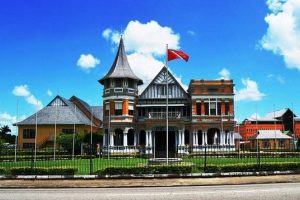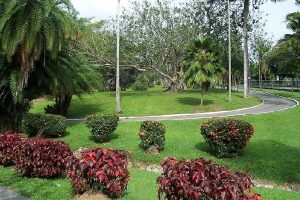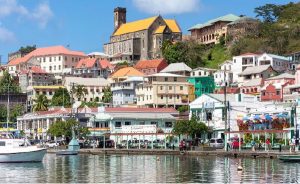I was fortunate to have met Dr. Dale Masi in a winter term class in grad school titled “Social Work in Industry”. This is where I first learned what an Employee Assistance Program (EAP) was. We hit it off immediately and she hired me as a paid intern in her federal HHS EAP. Once I graduated she presented to me an opportunity to travel to Trinidad and Tobago to consult with them and help them to set up EAP’s. Yes, I had just graduated and yes, I was a novice, but that never stopped me before. My wife, as usual, was up for an adventure, so off to the Caribbean we went.
I was working through the Trinidad and Tobago National Council on Alcoholism and Drug Abuse and they made arrangements for lodging and transportation. They set up meetings for me with some of the top businesses there. EAP was a new concept to them. At the time T&T had the highest rate of alcoholism in the world, based on the World Health Organization’s data of percentage of hospital admissions for alcohol related reasons. They topped the charts at 50%.
Trying to adapt to a new culture was an education in itself. We lived in a very old hotel called the Queen’s Park (British influence, even though they had obtained their independence in 1962) and it sat on the end of the Queen’s Park Savannah, 260 acres of parks, concert venues, cricket fields and a horse racetrack. On our first night walking around the Savannah, a coconut vendor had his son slice open the coconut with a machete that he whacked from the top of the coconut while holding the bottom of it in his hand. His son was not quite as skilled as the father and blood went everywhere. My wife, the nurse, tried to offer assistance but the father told him to wrap a towel around it and they both went right back to work. This is when we knew we weren’t in Kansas anymore.
I spent much of my time developing a training for 40 psychologists and social workers on what EAP’s were. The training went well but I remember bringing up the concept of confidentiality and hearing them all laugh. I was perplexed and they told me that even though it was a respected value, the idea of keeping confidentiality in a country of only 1 million people was VERY difficult because EVERYONE talks about everyone else. The culture was also VERY PRO alcohol. Mount Gay Rum and Angostura Bitters are made in Trinidad so trying to talk about alcoholism in this culture was challenging to say the least. I remember watching a TV commercial for Guinness in the hotel lobby with 10-12 people. The scenario was of a skinny man walking along the street and a woman with a flat tire asked for his help. Try as he might, he just could not budge that very tight lug nut. The woman then pops open her trunk and hands him a bottle of Guinness. He downs it, much like Popeye would gulp down his spinach, then tries again and magically gets that lug nut cracked. I laughed hysterically only to find that the Trinidadians looked at me with disdain. “That is not funny,” an older gentleman said. “Guinness gives you strength and It is good for you”. Who was I to argue?
You quickly learn when you are living in another country that whether or not you want to, you become an ambassador for your country and you become keenly aware of political situations and you learn how to respond carefully. We arrived in Trinidad in 1985, soon after Maurice Bishop had taken over the island of Grenada (the island immediately north of Trinidad) and their Prime Minister had asked Reagan to send troops and help them to take their country back. While Grenadians were grateful (I traveled there and had the opportunity to speak to many of their citizens), the Trinidadians were totally against our having “invaded”. I neither supported nor defended our actions and simply learned to listen carefully and express appreciation for their concerns.
My wife became pregnant with our first child, our daughhter, soon after we arrived in Port of Spain. She discovered this when she was volunteering at Planned Parenthood and they did a pregnancy test, only to tell her that it was negative. She knew different and one week later tested again and proved that sometimes instincts are more correct than science. Trying to find food that she found appetizing was becoming difficult. We were both a little homesick and after 4 months of having done some very interesting work, we were ready to head back. They tried to talk us into staying longer but we thanked them for their incredible hospitality and decided to move back home.
There were so many amazing lessons learned from this adventure, including how to live in a country as a minority; how to navigate our way around and learn to adapt to a new culture; and that sometimes you simply have to learn how to rely on the kindness of strangers.






